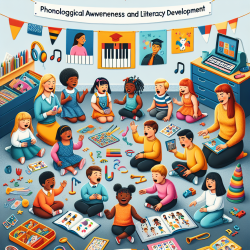As practitioners dedicated to creating positive outcomes for children, we understand the unique challenges faced by children with Down Syndrome (DS) in developing phonological awareness (PA) skills. A recent study titled Developing Phonological Awareness Skills in Children with Down Syndrome provides valuable insights into effective strategies for enhancing these critical skills. This blog will summarize the key findings and practical applications of this research to help you improve your practice.
Understanding the Research
The study involved 17 children with DS who were randomly assigned to either a PA program or an alternate program. The PA program included twice-weekly, 30-minute sessions over 22 weeks, focusing on rhyming and initial and final phoneme identification. The results indicated a significant improvement in final phoneme identification with a large effect size, demonstrating that focused intervention can effectively teach PA skills to children with DS.
Key Findings
- Targeted Intervention: Individual sessions focusing on specific PA skills, such as rhyming and phoneme identification, can lead to significant improvements.
- Final Phoneme Identification: The study found a significant treatment effect for phoneme identification in the final position, highlighting the importance of targeting both initial and final phonemes.
- Consistency and Duration: Regular, twice-weekly sessions over an extended period (22 weeks) were crucial for achieving measurable outcomes.
Practical Applications for Practitioners
Based on these findings, here are some practical strategies you can implement in your practice:
- Structured Sessions: Design individual sessions that focus on specific PA skills, ensuring consistency and regularity.
- Incorporate Fun Activities: Use engaging games and activities like bingo, fishing, and hide-and-seek to keep children motivated while targeting PA skills.
- Visual Supports: Utilize visual aids, such as pictures and letters, to reinforce auditory discrimination tasks without relying solely on visual matching.
- Monitor Progress: Regularly assess the child's progress and adjust the intervention as needed to ensure continued improvement.
Encouraging Further Research
While this study provides valuable insights, it also highlights the need for further research to refine and expand our understanding of effective PA interventions for children with DS. As practitioners, staying informed about the latest research and incorporating evidence-based practices into our work is essential for achieving the best outcomes for our clients.
To read the original research paper, please follow this link: Developing Phonological Awareness Skills in Children with Down Syndrome.










